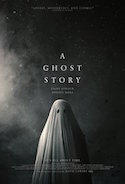 Back to selection
Back to selection
A Ghost Story

In A Ghost Story, Affleck and Mara play young couple “C” and “M,” who live in a small Texas house. “C” is a composer, recording his Bon Iver-esque songs at home into Pro Tools on his laptop. In the film’s opening minutes, he dies in a car accident. “M” visits him in the hospital and takes one last look at his body before “C” is covered with a sheet and sent to the morgue. Moments later, though, his body rises, exits the hospital and goes home — an almost ridiculously archetypal ghost, swathed in a white sheet with holes cut out for the eyes. Meanwhile, “M” has numbly returned to that same house, now quieted by his, absence and begins to grieve as “C” invisibly — to her — watches. Eventually, she moves on — literally and figuratively — but “C”’s ghost remains, unable to leave the structure that architected their love. Others move in, including hipsters who throw a party visited by Oldham, who spins another harrowing, homespun monologue — this time about the inevitable death of our planet. With the exception of Oldham’s words, the preceding is told with virtually no dialogue and shot, by DP Andrew Droz Palermo, in arresting 4:3 compositions, complete with rounded corners suggesting not only nostalgia (a series of old picture frames) but also a kind of retro-modernity (a “vintage” Instagram filter). And then, like the universe itself, A Ghost Story expands, revealing its true themes to be not just mortality but time in all of its harsh beauty and cruel poetry. To say more would ruin the emotional realizations viewers will individually find in this beautifully philosophical work, a film that’s thrillingly balanced on the razor’s edge of absurdity (that white sheet!) and profundity for its 90 increasingly impactful minutes. (Scott Macaulay)
